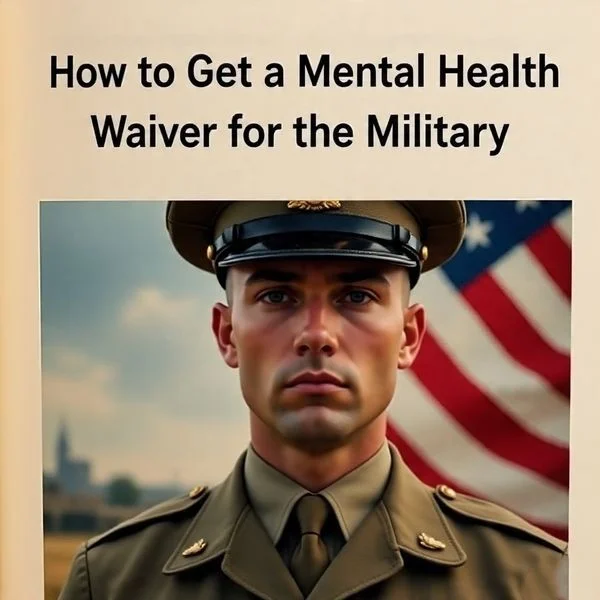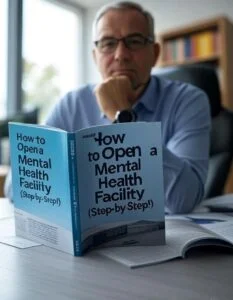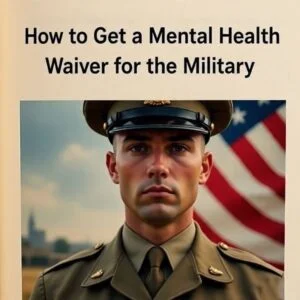How to Get a Mental Health Waiver for the Military:Can past mental health challenges join the military? Learn how to get a mental health waiver for the military. Honest, hopeful steps explained.
So, you want to serve your country? That’s amazing! Joining the military is a big, brave step. But maybe you’ve hit a snag. Maybe you had a tough time in the past. Anxiety? Depression? Something else? You heard the military has rules about mental health history. Now you’re worried. Does this mean your dream is over?
Take a deep breath. It might not be.
The military understands people grow and overcome challenges. That’s why they have something called a waiver. Think of it like asking for special permission. You show them you’re healthy now and ready to serve. This post is your friendly guide on how to get a mental health waiver for the military.
It might feel confusing or scary. That’s okay! We’ll break it down step-by-step. We’ll use simple words and real stories. Your past doesn’t have to define your future. Let’s explore how you can still pursue that uniform. Ready?
1. What is a Mental Health Waiver Anyway?

Imagine applying for a job. You have most qualifications, but maybe you missed one small thing. You talk to the boss. You explain why you’re still the best person. You ask for a chance. A military waiver is kinda like that conversation.
Specifically, a mental health waiver is official permission to join the military despite a past diagnosis or treatment that would normally disqualify you. The military has strict health rules (they need people ready for tough jobs!). But they also know people heal and change.
Why do waivers exist? Because the military values potential. If you’ve successfully managed a past mental health issue, proven you’re stable, and meet all other requirements, they want to consider you. It’s not a guaranteed “yes,” but it’s a real pathway.
- Key Takeaway: A waiver isn’t hiding your past. It’s honestly showing how you’ve moved past it and are fit to serve now.
2. Common Reasons You Might Need a Waiver

Not every past counseling session needs a waiver. The military is mostly concerned with conditions that could affect your ability to handle stress, follow orders, or stay safe. Here are some common situations:
- Past Diagnoses: Depression, anxiety disorders, ADHD (especially if medicated after age 14), bipolar disorder, PTSD (not related to combat if you haven’t served yet), eating disorders, or self-harm history.
- Treatment History: Being hospitalized for mental health, seeing a therapist or counselor regularly for a significant period, or taking certain medications (like antidepressants or stimulants) within a specific timeframe (often 1-2 years, but it varies).
- School Accommodations: Having an IEP or 504 plan in school mainly for behavioral or emotional reasons.
Real Talk: My friend “Sam” had bad anxiety in high school. He saw a counselor for a year and took meds briefly. He got better, learned coping skills, and stopped treatment. Years later, he wanted to join the Army. His history required a waiver. It took effort, but he got it! He focused on showing his current strength.
3. Step-by-Step: How to Get a Mental Health Waiver for the Military
Okay, this is the big one! How does it actually work? It’s a process, but totally doable. Here’s your roadmap:
- Be Honest from the Start: When you talk to a recruiter, tell them everything about your mental health history. Do NOT lie or try to hide it. Getting caught later is way worse and can end your military career before it starts. Your recruiter is your first guide.
- Gather Your Medical Records: This is crucial. You’ll need detailed records from any doctors, therapists, or hospitals involved in your care. This includes:
- Diagnosis details.
- Treatment plans and dates.
- Medication history (what, when, dosage).
- Progress notes showing improvement and stability.
- Discharge summaries if hospitalized.
- See a Military Doctor (MEPS): You’ll go to a Military Entrance Processing Station (MEPS) for a full physical and interview. Be prepared to discuss your history openly. The doctor will review your records.
- The Disqualification (DQ): Based on your history and MEPS review, you’ll likely get a temporary medical disqualification. This is normal! It just means you need that waiver.
- Waiver Request Package: Your recruiter will help compile everything – your records, MEPS results, and often letters of recommendation. Sometimes, they might ask for a current evaluation from a civilian doctor.
- The Waiting Game: Your package goes “up the chain.” A higher medical authority or waiver board reviews everything. They look for:
- How long ago the issue was.
- How successful treatment was.
- How long you’ve been stable without treatment/medication.
- Evidence you can handle stress.
- Strong references.
- The Decision: You get a “Yes” (waiver approved!), a “No” (waiver denied), or sometimes a request for more information.
Patience is key! This process can take weeks or even months. Stay positive and stay in touch with your recruiter.
4. Boosting Your Chances: Tips for Waiver Success
Want to make your waiver request as strong as possible? Here’s how:
- Show LONG-Term Stability: The longer you’ve been symptom-free and off medication (if applicable), the better. Waivers for very recent issues are harder to get.
- Get Awesome Letters: Ask therapists, doctors, employers, teachers, coaches, or community leaders who know you well. They should write about:
- Your current mental and emotional stability.
- Your reliability, work ethic, and character.
- Your ability to handle pressure.
- How you’ve matured and overcome challenges.
- Explain Your Growth: If possible, include a personal statement. Briefly explain your past situation, what you learned, the coping skills you gained, and why you believe you are fully capable now. Focus on resilience!
- Be Proactive & Organized: Help your recruiter! Provide clear, complete records quickly. Follow up politely. Show you’re serious and responsible.
- Stay Healthy: Continue managing your well-being through exercise, good sleep, healthy habits, and positive social connections. This isn’t just for the waiver – it’s for your future success!
Think of it like applying for college. You want to present your best, most complete self. The waiver board needs to see the strong person you are today.
5. What Happens If Your Waiver is Denied?
Hearing “no” is tough. Really tough. It can feel like a door slamming shut. But please remember:
- It’s Not the End of You: A waiver denial is about military regulations and risk assessment at that specific moment. It is NOT a judgment on your worth or your potential in life.
- Ask Why (If Possible): Sometimes, your recruiter can get feedback on why it was denied. Was it recency? Lack of documentation? Understanding the reason can help if…
- Consider an Appeal: In some cases, especially with new information (like more time passing stably, or an amazing new letter), you might be able to appeal the decision. Talk to your recruiter about the possibility.
- Explore Other Paths: The military has many civilian roles supporting our troops! Consider DoD jobs, working for military contractors, or serving through organizations like the Peace Corps or AmeriCorps. Your desire to serve and contribute is valuable everywhere.
- Focus on Your Well-being: Whatever path you take next, prioritizing your mental health is the most important mission. Keep building your resilience and pursuing your goals.
Sam’s friend “Alex” got denied initially. It stung. But Alex kept working, stayed stable for another year, got a great promotion at work (showing responsibility), and gathered more supportive letters. He reapplied and got the waiver the second time. Persistence paid off.
6. Life After the Waiver: Serving Successfully

You got the waiver! Huge congratulations! That green light is a testament to your hard work and resilience. Now what?
- Stay Vigilant: Military life is demanding. Continue using the healthy coping skills you’ve learned. Don’t ignore stress – address it early.
- Use Resources: The military offers tons of support: chaplains, mental health professionals, peer support groups, and family readiness centers. These are signs of strength, not weakness. Use them proactively!
- Be Open (Within Your Comfort): You don’t need to announce your waiver history to everyone. But if you struggle, confide in a trusted leader, buddy, or medical professional. Getting help early is crucial.
- You Earned Your Spot: Walk in with confidence. You proved you belong there. Focus on your training, your job, and being an outstanding service member.
FAQ Section: Your Quick Questions Answered
- Q: How to get mental health waiver military?
A: Tell your recruiter everything honestly. Gather detailed medical records (diagnosis, treatment, stability proof). Go through the MEPS physical. Work with your recruiter to submit a strong waiver package including records and recommendation letters. Wait for the decision. Be patient and proactive! - Q: How to get a military waiver approved?
A: Boost your chances by showing long-term stability (time off meds/symptom-free), getting powerful recommendation letters focusing on your current strength and reliability, being super organized with records, explaining your personal growth, and demonstrating overall responsibility and good character. - Q: Can I join the military if I have a mental illness?
A: It depends heavily on the specific condition, its severity, how long ago it was, treatment success, and current stability. Current serious mental illness (like active psychosis or severe untreated conditions) is disqualifying. Past conditions often require a waiver. Honesty with your recruiter is the first step to find out your options. - Q: Can you get out of the military for mental health reasons?
A: Yes, but it’s a process, not automatic. If a serious mental health condition develops during service that makes you unfit for duty (despite treatment), a medical evaluation board may recommend separation. This is different from seeking help – getting treatment is encouraged and usually helps you stay in. Never suffer in silence; resources are there to support you.
Conclusion: Your Strength is Your Story
Navigating how to get a mental health waiver for the military takes courage, honesty, and patience. We’ve covered a lot: what waivers are, common reasons you might need one, the step-by-step process, tips to strengthen your case, handling a “no,” and thriving after a “yes.”
Remember this:
- Honesty is non-negotiable. It builds trust and is the foundation of your application.
- Your past challenges can become your strengths. Overcoming them shows resilience the military values.
- Preparation is power. Gather those records, get those letters, tell your story of stability.
- Patience is part of the process. Wait times can be long, but stay positive and stay in touch.
- Support is available. Lean on your recruiter, trusted adults, and mental health resources.
Getting a waiver isn’t easy, but it is possible for many. Your mental health history doesn’t have to be the end of your military dream. It can be the beginning of a powerful story of overcoming and serving.
Ready to take the next step? Reach out to a military recruiter today. Be upfront, ask questions, and see if a waiver might be your path forward. Your country – and your future self – will be glad you did.
You’ve got this!
Read More :Mental Health T Shirts: Wear Your Heart on Your Sleeve!












